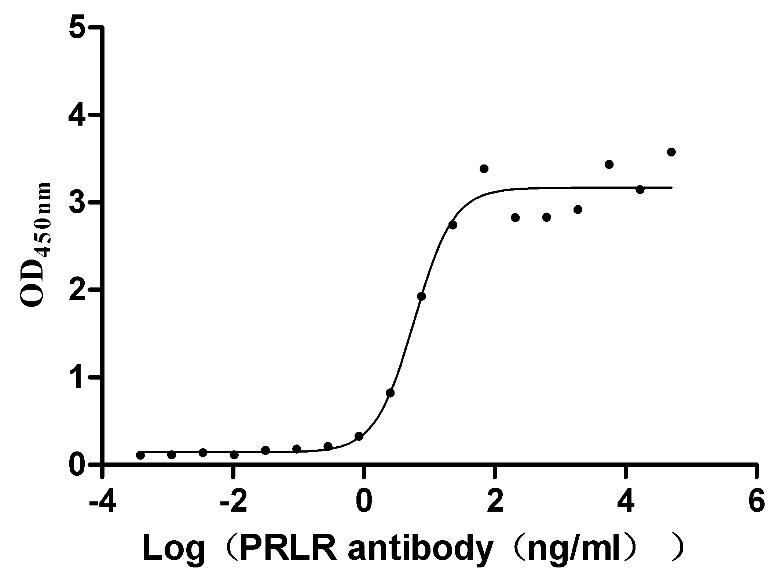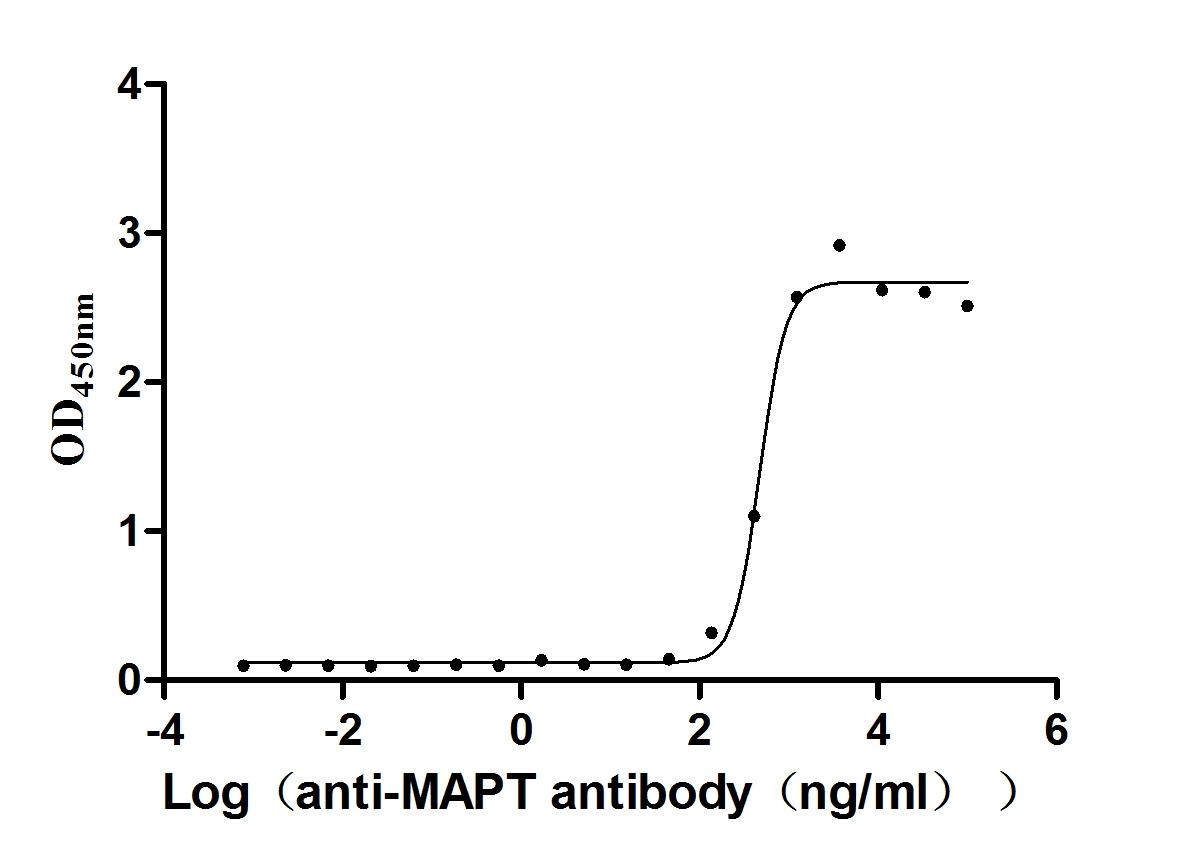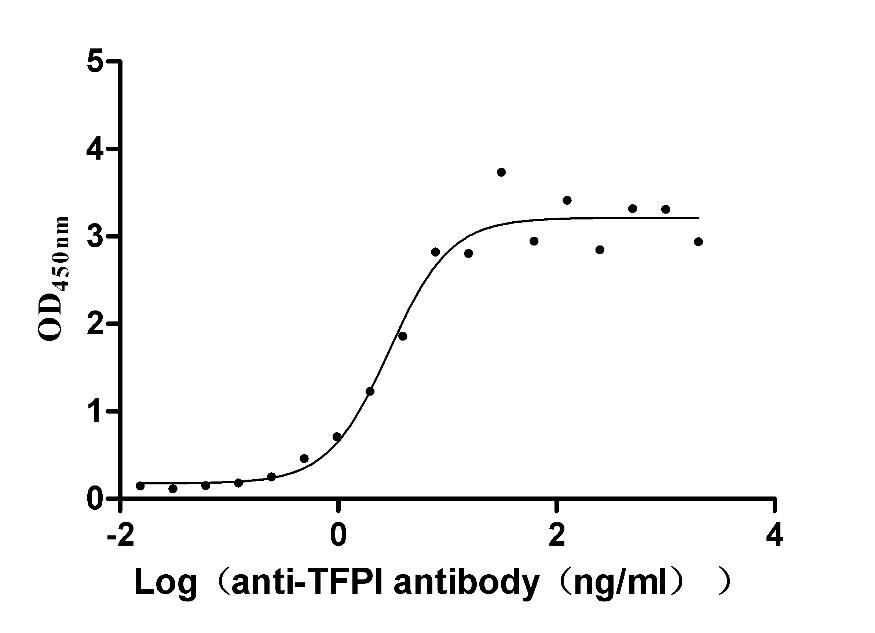Recombinant Human Asialoglycoprotein receptor 1 (ASGR1)
-
中文名稱:Recombinant Human Asialoglycoprotein receptor 1(ASGR1)
-
貨號:CSB-CF002207HU
-
規(guī)格:
-
來源:in vitro E.coli expression system
-
其他:
產(chǎn)品詳情
-
基因名:
-
Uniprot No.:
-
別名:ASGP-R 1; ASGPR 1; ASGPR; ASGPR1; Asgr1; ASGR1_HUMAN; Asialoglycoprotein receptor 1; C type lectin domain family 4 member H1; C-type lectin domain family 4 member H1; CLEC4H1; Hepatic lectin H1; HL-1
-
種屬:Homo sapiens (Human)
-
蛋白長度:full length protein
-
表達(dá)區(qū)域:1-291
-
氨基酸序列MTKEYQDLQHLDNEESDHHQLRKGPPPPQPLLQRLCSGPRLLLLSLGLSLLLLVVVCVIGSQNSQLQEELRGLRETFSNFTASTEAQVKGLSTQGGNVGRKMKSLESQLEKQQKDLSEDHSSLLLHVKQFVSDLRSLSCQMAALQGNGSERTCCPVNWVEHERSCYWFSRSGKAWADADNYCRLEDAHLVVVTSWEEQKFVQHHIGPVNTWMGLHDQNGPWKWVDGTDYETGFKNWRPEQPDDWYGHGLGGGEDCAHFTDDGRWNDDVCQRPYRWVCETELDKASQEPPLL
Note: The complete sequence including tag sequence, target protein sequence and linker sequence could be provided upon request. -
蛋白標(biāo)簽:10xHis-SUMO-tag
-
產(chǎn)品提供形式:Liquid or Lyophilized powder
Note: We will preferentially ship the format that we have in stock, however, if you have any special requirement for the format, please remark your requirement when placing the order, we will prepare according to your demand. -
緩沖液:Lyophilized from Tris/PBS-based buffer, 6% Trehalose, pH 8.0
-
儲存條件:Store at -20°C/-80°C upon receipt, aliquoting is necessary for mutiple use. Avoid repeated freeze-thaw cycles.
-
保質(zhì)期:The shelf life is related to many factors, storage state, buffer ingredients, storage temperature and the stability of the protein itself.
Generally, the shelf life of liquid form is 6 months at -20°C/-80°C. The shelf life of lyophilized form is 12 months at -20°C/-80°C. -
貨期:Basically, we can dispatch the products out in 1-3 working days after receiving your orders. Delivery time may differ from different purchasing way or location, please kindly consult your local distributors for specific delivery time.Note: All of our proteins are default shipped with normal blue ice packs, if you request to ship with dry ice, please communicate with us in advance and extra fees will be charged.
-
注意事項(xiàng):Repeated freezing and thawing is not recommended. Store working aliquots at 4°C for up to one week.
-
Datasheet & COA:Please contact us to get it.
相關(guān)產(chǎn)品
靶點(diǎn)詳情
-
功能:Mediates the endocytosis of plasma glycoproteins to which the terminal sialic acid residue on their complex carbohydrate moieties has been removed. The receptor recognizes terminal galactose and N-acetylgalactosamine units. After ligand binding to the receptor, the resulting complex is internalized and transported to a sorting organelle, where receptor and ligand are disassociated. The receptor then returns to the cell membrane surface.
-
基因功能參考文獻(xiàn):
- Authors report the generation of a human embryonic stem cell line WAe001-A-6 harbouring homozygous ASGR1 mutations using CRISPR/Cas9. The mutation involves a 37bp deletion, resulting in a frame shift. PMID: 28952928
- PEGylated lipoplexes were well tolerated by both HEK293 (ASGP-R-negative) and HepG2 (ASGP-R-positive) cell lines and delivered DNA to the hepatoma cell line HepG2 by ASGP-R mediation at levels three-fold greater than nonPEGylated lipoplexes. PMID: 28063265
- findings show that the hepatitis E virus (HEV) ORF2 protein interacts directly with the ectodomain of both ASGR1 and ASGR2; ASGPR is involved in and facilitates HEV infection by binding to ORF2 PMID: 27155063
- ASGR1 can inhibit the activity of V-ATPase by interacting with LASS2, thereby suppressing the metastatic potential of hepatoma cells. PMID: 27241665
- This review will focus on the mechanisms of platelet senescence with specific emphasis on the role of post-translational modifications in platelet life-span and thrombopoietin production downstream of the hepatic Ashwell-Morrell receptor, originally termed asialoglycoprotein receptor (ASGPR). PMID: 27207430
- ASGR1 haploinsufficiency was associated with reduced levels of non-HDL cholesterol and a reduced risk of coronary artery disease. PMID: 27192541
- Flow cytometric assessment of ASGPR expression may be a useful predictor of liver dysfunction following major hepatectomy for HCC in Chinese patients. PMID: 25404440
- Anti-ASGPR antibody could be used for specific and efficient HCC CTC enrichment, and anti-P-CK combined with anti-CPS1 antibodies is superior to identification with one antibody alone in the sensitivity for HCC CTC detection. PMID: 24763545
- Endocytic AMR controls TPO expression through Janus kinase 2 (JAK2) and the acute phase response signal transducer and activator of transcription 3 (STAT3) in vivo and in vitro PMID: 25485912
- Anti-ASGPR levels correlate with biochemical parameters and with the severity and manifestation autoimmune processes in patients with autoimmune hepatitis. PMID: 24933948
- The examined ASGPR1 expression levels by immunohistochemistry in HCC with different grades. Guidance for a targeting delivery strategy for anti-cancer drugs to HCC is suggested in this report. PMID: 23979840
- the distribution of ASGR in human testis, was investigated. PMID: 23604802
- the cooperative binding mode of Ca(2+) makes it possible for ASGP-R to be more sensitive to Ca(2+) concentrations in early endosomes, and plays an important role in the efficient release of ligand from ASGP-R PMID: 22613667
- Constant sH2a levels suggest constitutive secretion from hepatocytes in healthy individuals; therefore, a decrease with cirrhosis suggests a diagnostic potential. PMID: 22219600
- found that the asialoglycoprotein receptor (ASGPR) is involved in hepatocyte recognition of cells predestined for killing, including activated autologous T lymphocytes PMID: 21656538
- Asialoglycoprotein receptor (ASGPR) interacted specifically and directly with the preS1 domain of HBV in vivo and in vitro. PMID: 21207081
- Two naturally occurring ASGPR1 splice variants are produced in human hepatocytes. PMID: 20886072
- our findings suggest that both fibronectin and ASGPR mediate HBsAg binding to the cell surface, which provides further evidence for the potential roles of these two proteins in mediating HBV binding to liver cells. PMID: 20364278
- The minor subunit splice variants, H2b and H2c, of the human asialoglycoprotein receptor are present with the major subunit H1 in different hetero-oligomeric receptor complexes PMID: 11943787
- primary renal proximal tubular epithelial cells have a functional ASGPR, consisting of the H1 and H2 subunits, that is capable of specific ligand binding and uptake PMID: 12119473
- Phosphorylation-dependent interaction with molecular chaperones PMID: 12167617
- the effects of palmitoylation on ASGP-R activity and function PMID: 12359251
- the spacing of a Cys residue relative to the TMD in the primary protein sequence of H1 is the major determinant for successful palmitoylation PMID: 12370180
- Exposure of beta-galactose results in the rapid clearance of platelets from the circulation by asialoglycoprotein receptor-expressing liver macrophages and hepatocytes. PMID: 19520807
顯示更多
收起更多
-
亞細(xì)胞定位:[Isoform H1a]: Membrane; Single-pass type II membrane protein.; [Isoform H1b]: Secreted.
-
組織特異性:Expressed exclusively in hepatic parenchymal cells.
-
數(shù)據(jù)庫鏈接:
Most popular with customers
-
Recombinant Human Angiotensin-converting enzyme 2 (ACE2), partial (Active)
Express system: Mammalian cell
Species: Homo sapiens (Human)
-
Recombinant Human Heat-stable enterotoxin receptor (GUCY2C), partial (Active)
Express system: Mammalian cell
Species: Homo sapiens (Human)
-
Recombinant Human HLA class II histocompatibility antigen gamma chain (CD74), partial (Active)
Express system: Mammalian cell
Species: Homo sapiens (Human)
-
Recombinant Mouse Prolactin receptor (Prlr), partial (Active)
Express system: Mammalian cell
Species: Mus musculus (Mouse)
-
Recombinant Mouse Microtubule-associated protein tau (Mapt) (Active)
Express system: Mammalian cell
Species: Mus musculus (Mouse)
-
Recombinant Rabbit Tissue factor pathway inhibitor (TFPI) (Active)
Express system: Mammalian cell
Species: Oryctolagus cuniculus (Rabbit)
-
Recombinant Mouse Complement component C1q receptor (Cd93), partial (Active)
Express system: Mammalian cell
Species: Mus musculus (Mouse)
-
Recombinant Human Alkaline phosphatase, germ cell type (ALPG) (Active)
Express system: Mammalian cell
Species: Homo sapiens (Human)




-AC1.jpg)















